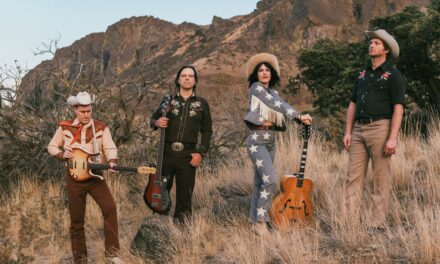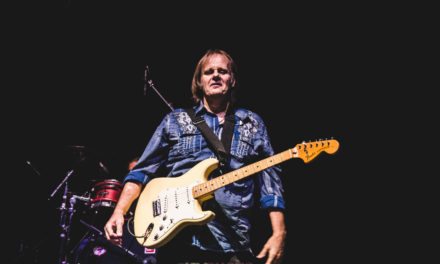Sonny Landreth
Sunday 19th April 2015
Blues Bound
Our man Landreth has a new rootsy album called ‘Bound By the Blues’ out on Mascot Label Group/Provogue Records…time for Pete to call Louisiana and get the lowdown from the slide ace … here’s the full conversation
JLTT: Hello, is it morning there? What time is it?
SL: Well actually it’s a little after one o’clock.
Right so here we are. It’s a new album and it’s completely different territory from your art gallery type album with the blue cover which was a lovely piece of impressionism really wasn’t it?
Yeah it’s a really very different project, using an orchestra and doing it harmonically was what I did previously. So this time, I headed back to the blues and it’s a simpler format. Actually, it is just a three-piece band and we basically went into the studio and cut like we would do at a gig. Several of these songs.
Good. Well this is where I started for sure, going out and seeing Fleetwood Mac and Savoy Brown so we both started in the right place. Now let’s talk about the title track ‘Bound by the Blues’, this evokes your muses and a lot of them were mine too.
Right.
I mean I saw Muddy Waters with Otis Spann and I saw Hendrix. Did you see those artists because they’re both mentioned?
Yeah I did. The only one I’ve never seen live is Buffy Saint Marie and all the others I had along with many other heroes. As far as the album, one part is a tribute to my heroes and the other part is finding a common thread I think universally. Facing challenges through great adversity.
Ok. See I’ve got this theory that the two things in the world that can actual unite people are not religion, not politics, not anything mystic it’s music and comedy.
Well you make a good point. It’d be hard to argue, Pete
We can all join in those things. People can enjoy what’s being created in front of them. I think with blues and rock music, it’s the fact that it is not a score and things can happen. Tangents can slip in and I’m sure that’s why it’s universally appealing but what do you think?
Absolutely. I think people do relate to it and it’s get to the heart of the matter. We all relate to the challenges of life on many different levels. I think part of the perspective of music, as you say; you share that without a barrier. I’ve played with musicians all over the world and it’s a really beautiful thing.
Yeah I know. Marcus Miller’s the same and he plays with guys from Africa and Cuba and he manages to create something good that’s the best of all of them.
Yeah I once played a festival and they had a great guitarist who didn’t speak enough English and a little bit of French. It was a really wonderful experience. We started playing together and sharing the tune. That was a really blast for me and a great lesson in what we’re talking about here.
Are you playing a Resonator on that title track?
Yeah I did. I mixed it a little bit more with the reso on a couple of songs and that one in particular. Especially with the second round of the verse and a National guitar and it sort of bridged the gap between acoustic and electric.
It’s quite a catchy chorus. I mean, in a slightly heavy arrangement this could be Bad Company, Sonny.
(Laughs)
It’s got that kind of tap the steering wheel thing…
Yeah that one goes in a lot of directions at the same time. I just let it go. I had a bit of a struggle with the melodic chorus. It’s really more a song about the influences and the music. It’s not really the blues.
It could be a radio-friendly blues rock hit like Foghat or something and that’s great because that’s how so many people get into the music we love.
Sure. What we do is promote the message of traditional music to bridge the gap. I think it does open doors.
I was talking to Marty Stuart and I said there was one particular track and that got me into him and he goes ‘It doesn’t matter which door you’ve come through as long as you’ve arrived here!’
(Laughs) That’s it man!
Let’s just walk through the tracks. ‘Walking Blues’, it’s a steadier tempo than most versions.
That was my biggest influence Paul Butterfield.
Yeah I’ve got Paul Butterfield written down here. That’s the first version I ever heard!
Yeah then he came back and did it again. He called it ‘New Walking Blues’.
That’s it.
Covers like that are songs I heard first and that speaks better for me with electric slide. I used different techniques voices on the slide for that.
It reminded me of the sound of ‘South of One Ten’.
Well it could be.
It’s got that fluid sound that you do. The first album I got of yours was ‘South of One Ten’. That got me into that sort of liquid thing that you do.
Yeah now that comes from starting on the trumpet. I played trumpet for several years. You do have to take a breath and there’s something about the legato break. I loved it man.
Now you’ve done a song on here that I can’t stand but it’s nice, ‘It Hurts Me Too’.
(Laughs)
Now the reason why we Brits are not so keen on Elmore James is because the original Fleetwood Mac had Jeremy Spencer. He’d come on and he’d do six or seven Elmore James songs in exactly the same key and tempo. By the end of the sixties I’d had enough of Elmore James!
(Laughs) Too much of a good thing! Believe me, I knew I was taking on a lot by playing some of these standards. In a way, I have had no business doing it but the truth of the matter is I’m a creator. It’s a lot of work taking these songs that have been done so much and putting a breath of fresh air into it. And another thing, these are songs that I started playing a long time ago and they developed so much over the years they’d come in and out of different bands. They are songs that just kept evolving and every song has a life of its own. I think that’s really important.
The track I really love here is ‘Where They Will’. Track five and it has a stealthy tempo…plus it’s such a distinctive vocal and it’s a killer track. I really like it.
I appreciate that man.
It almost begs for a string quartet.
Well it could’ve been! In a way, that song was kind of a misfit just because it’s right on the border in the sense of different direction. Then again, that’s what I love about it. I also like to infer things, you can infer string arrangements. You can hear string arrangements.
That’s what I’m hearing.
Yeah. When I began mastering it, my master engineer and I kind of hit on the same thing and he said ‘This song kind of has its own life in a way.’ But then it has so much of the overall picture I think of this project so I couldn’t let it go.
No. But you could take each note of the string that’s ringing and have a bow-stringed instrument playing it. That’s what rolled into my ears. The string arrangement is there isn’t?
Yeah I always think about the future and working with artists like I did a few years ago, I definitely wanna get back to maybe a live project with strings or something.
Well look, way back in 68’ I was listening to Harvey Mandel playing ‘Wade In the Water’ with a large orchestra on ‘Cristo Redentor’. That sure influenced my choice of chord voicing.
Oh yeah. I haven’t heard that.
‘Cristo Redentor’ it’s a great album. ‘Wade in the Water’ is one of the key tracks on it. They’ve just released a Harvey boxset and it’s on there but big influence on poor little me. Now ‘Cherry Ball Blues’ is real fun isn’t? It’s a real Savoy Brown rock out. It sounds like you were having some fun on that.
Oh always! But that was one that came about there was a blues festival in New York City several years ago it was a tribute to Jesse Gibb and it was just a duo. We went back through Gibb’s back catalogue. We just started playing it and it went on from there.
I think it’s great. Now the Johnny Winter tribute I think I’ve spotted is ‘Firebird Blues’ track seven. Is that what was intended?
Yeah we were just going into the session to do this album and we heard on the new that Johnny had passed. I just felt that I wanted to do something as just a small way to remember him and he was an influence on so many of us.
At one time you said you were going to Japan to do some shows with Johnny.
Yeah we did and it was great fun. We got to hang out a bunch. It’s so funny, the first thing he asked me, and he said ‘I’ve got a question to ask you?’ I said ‘What?’ He asked ‘Did you really play with Clifton Chennier ? (Laughs)
(Laughs)
I said ‘Yeah man I did.’ He goes ‘Oh man he was so great. I used to play with him in Texas.’ We talked about all kinds of stuff.
What I like on that, obviously it’s very sincerely played straight but it’s got this buzzy sound with slight delay and that does give it that Johnny Winter tinge. The tempo is the same tempo as do you remember a track called ‘Be Careful With A Fool’ off the first Columbia album?
Oh sure! Yeah….
It kind of goes into that sort of tempo, that Johnny was so very good at.
Oh yeah he just did a great slow blues. The other thing, Johnny was a big fan of Hendrix and so I wanted to get a little bit of that and make it melodic. We literally cut it without any practice. We just played the blues and I think it’s like the second take.
It sounds very fluid and it does sound like it’s got some depth to it. The penultimate track has a stately tempo and loving playing with delay. I think it’s ‘Key to the Highway’ actually.
Oh sure.
Again, that’s a song that everybody does.
Oh yeah everybody does it and I just started playing that in the early seventies. I always loved the song and I love Little Walter’s version. I was trying to find a way to keep the sound but to take in different elements for these songs ‘Key to the Highway’ in particular. That has been familiar song for me because I’ve been playing it for so long. I just took it to another place.
Ok. Track ten, is it ‘Simcoe Street’?
Yeah it is.
I put that on and I thought ‘Bloody hell! That’s Homesick James. Now you’re probably too young to remember a label called Sue.
Oh no……..I do !
Sue was a label that put out 45s here with Homesick James stuff. We loved it because it wasn’t Chicago, it was country blues but electric. It was what Taj Mahal delivered in spades. I wondered if you remembered Homesick James?
Oh absolutely! You know, that’s probably a really good point because I always did that too. You went to the city but didn’t quite get there was the sound. This particular song, we were gonna record it for the last album but I guess I had to decide on the changes. It was like the next track we didn’t get to it so I kind of always wanted to come back to it. Once I did, I came up with the rest of the changes to it. That’s an interesting way to work too, where you have ideas you didn’t quite finish and then you come back to them later. Once you know you’re gonna record it, it’s a completely different focus. Some of my favourite ideas come from that. That’s one of the most exciting things about writing and recording.
It’s not quite the city thing I get that. Kim Simmonds of Savoy Brown and I, we love Lightning Hopkins.
Oh yeah.
That isn’t heavy Chicago streets music. It’s coming from the country but it’s actually in motion towards the city. Do you know what I’m saying?
Yeah almost like making the drive from the Delta and along the way, stopped along the way. I heard Lightning play a couple of times and I saw him in Texas. That must have been back in the early seventies. I saw him in a place in town down by the river. They used to get bands playing there for a while and Lightning would just show up and they’d hire a local bass player. That’s a good way to put it. This album goes in another direction for sure.
I’ve got an album I only recently discovered by a guy, you probably know him, called Denny Walley who played slide with Frank Zappa and played slide with The Magic Band.
Oh yeah!
I discovered the other day; he made an album in Sweden called ‘Spare Parts’. It’s got ‘Down in the Bottom’, ‘Shake Your Money Maker’, ‘Shake Your Hips and a couple of Zappa tracks. He had a similar journey to you but he was doing it with pals in Sweden. Denny’s very distinctive but when you talk to him he can’t quite explain how he’s doing what he’s doing. I don’t know if you ever got into Beefheart?
Oh yeah. ‘Trout Mouth Replica’ and all the other stuff. In fact, believe it or not I actually have a Band Master that was in one of their road cases.
Tremendous. This is great. You’re always thoughtful about what you do but you’ve seemed to let feel through here to dominate it and the techniques just come with the feel. Is that fair?
Sure I mean feel is everything. You’ve gotta be inspired man. If you don’t have the soul or feel for it… There’s nothing wrong with practicing technique I mean I do that too. If I’m working on something, it’s not long before an idea comes up and that goes into getting the right feel, dictate the path you’re on, the changes you come up with.
Yeah. This way you play for the heart but you satisfy the head.
If that’s true it makes me very happy. I’m a happy man.
Alright mate. It’s great to talk to you again and it’s always nice keeping in touch.
I appreciate that, man.
Well good luck with this. You’re on a good label and we know these guys very well and we work really closely with them and luckily all the artists seem to like talking to us.
That’s a truth and it sure makes a difference.
Plus you guys like you, Robben (Ford), Joe Bonamassa, Jonny Lang, Eric Johnson and that are good at explaining what you’re thinking and stuff. Have a good day.
Take care of yourself.
When are you coming over here, man?
I keep hearing that. That’s definitely part of deciding to make the deal with Mascot is to get over to your way and Europe. (Laughs) I’ll try not to blow up the amps!..take care Pete.
Pete Sargeant
Sonny Landreth’s new album ‘Bound By The Blues’ is released on 8th June 2015 on Mascot Label Group/Provogue Records on CD and LP. For more information visit: www.sonnylandreth.com





